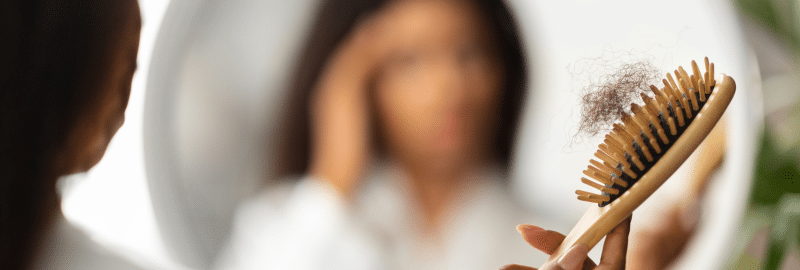Hair loss in women can be particularly distressing and seriously impact your self-esteem and confidence. With 1 in every 68 women in the U.S. experiencing hair loss caused by alopecia areata, this autoimmune disease is both common and treatable.
This Alopecia Areata awareness month, ADF dermatology is here to help you understand the common triggers of this disease and find effective treatments to restore your hair and self-confidence.
What Triggers Alopecia Areata in Women? Genetics, Environment, and Other Causes
As an autoimmune disorder, alopecia areata is a dysfunction of the immune system. The body mistakenly identifies hair follicles as a foreign body, causing the immune system to attack and damage them. This leads to hair loss, typically in round patches on the scalp. When alopecia areata advances to affect the entire scalp it is called alopecia totalis and may also cause loss of eyebrow hair, eyelashes, and other forms of body hair.
Research has not identified the exact cause of the autoimmune response behind alopecia areata in women, but some common factors may contribute to triggering it.
Genetics: There is a genetic component to alopecia areata, as it tends to run in families. People with a family history of autoimmune diseases are more likely to develop the condition.
Immune System Dysfunction: In people with alopecia areata, the immune system mistakenly targets hair follicles as if they were harmful invaders, leading to inflammation and hair loss.
Environmental Triggers: Certain environmental factors, such as stress, illness, or trauma, may trigger the onset of alopecia areata or cause flare-ups in those who are genetically predisposed.
Other Autoimmune Diseases: People with alopecia areata often have other autoimmune conditions, such as thyroid disease, vitiligo, or type 1 diabetes, which suggests a broader immune system dysfunction.
Viral Infections: Some researchers believe that viral infections could play a role in triggering the immune response that leads to alopecia areata, although this connection is not yet fully established.
How is Alopecia Areata Treated in Women?
Treating hair loss caused by alopecia areata primarily focuses on calming an overreactive immune response. This may take a few different forms, including:
Topical or injectable corticosteroids: help reduce inflammation around hair follicles.
Minoxidil: promotes hair regrowth.
Oral immunosuppressants: help to prevent the immune system from targeting hair follicles.
Your dermatologist may also suggest lifestyle adjustments to help support hair regrowth and minimize the impact of factors like co-occurring medical conditions, stress, and poor diet. This holistic approach to treating female-pattern baldness and hair loss helps to ensure that all aspects of your health are addressed, promoting not just hair regrowth but overall well-being.
At ADF Dermatology, we offer a personalized approach to hair loss treatments tailored to meet the unique needs of each patient. Our team, led by board-certified dermatologist Dr. Alfredo D. Fernandez, takes the time to conduct a full scalp health exam and discuss your concerns to develop an effective treatment regimen for you. Get started in your hair regrowth journey and schedule an appointment with our team today.




